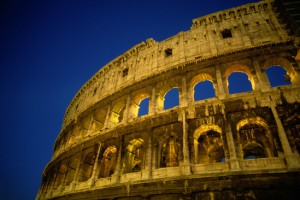Rome
Sprawled across seven legendary hills, romantic and beautiful Rome was one
of the great centers of the ancient world. Although its beginning is shrouded
in legend and its development is full of intrigue and struggle, Rome has always
been and remains the Eternal City.
Rome enjoyed its greatest splendor during the 1st and 2nd centuries when art
flourished, monumental works of architecture were erected, and the mighty Roman
legions swept outward, conquering all of Italy. These victorious armies then
swept across the Mediterranean and beyond to conquer most of the known world.
With Rome's establishment as capital of the western world, a new ascent to glory
began.
Today's Rome, with its splendid churches, ancient monuments and palaces, spacious
parks, tree-lined boulevards, fountains, outdoor cafes and elegant shops, is
one of the world’s most attractive and exciting cities. Among the most famous
monuments is the Colosseum. As you walk its cool, dark passageways, imagine
the voices that once filled the arena as 50,000 spectators watched combats between
muscled gladiators and ferocious animals.
Stop to see the remains of the Forum, once the city's political and commercial
center. In later times, Rome's squares were enhanced with such imposing structures
as the Vittorio Emanuele Monument and grandiose fountains like the Fontana di
Trevi. Join the millions who stand in awe of Christendom’s most magnificent
church and admire the timeless masterpieces of Michelangelo's frescoes in the
Sistine Chapel.
Rome jars the senses and captures the soul. Grasp all you can during the short,
precious time you have available in the Eternal City. With so much to see and
do, a day or two will only allow you a sampling of the city's marvelous treasures.
Caution: As in many big cities and tourist destinations purse snatching
and pickpocketing is common. Valuable jewelry and excess cash are best left
in a safety deposit box in your hotel.
Shopping For most visitors shopping for beautiful Italian leather articles,
designer shoes, fashions for men and women, linens, knitwear, silk scarves and
ties is a favorite pastime. Except for tourist-oriented shops, the majority
of stores are closed on Sundays. Some of the department stores, such as Rinascente,
open in the late afternoon on Sundays.
Cuisine Rome's choice of restaurants is mindboggling as is the variety
of cuisine. Whether your meal is at a top-rated restaurant or a rustic trattoria,
you can be sure that you will enjoy your food, especially when accompanied by
wines from the hill towns surrounding Rome.
Other Sights Rome's attractions are endless, and depending on how much
time you have at your disposal a careful selection has to be made about what
to see. Be aware of horrendous traffic conditions and major construction work
all around the city in preparation of Jubilee 2000, the Holy Year. Some of the
sights not to be missed:
Piazza Venezia - This busy square is easily recognized by its imposing Vittorio
Emanuele II Monument. The white marble structure was inaugurated in 1911 as
a symbol of Italy’s unification.
The Forum - Once the civic heart of ancient Rome, today the remains include
a series of ruins, marble fragments, isolated columns and some worn arches.
Colosseum - No visit to Rome is complete without a stop at this awe-inspiring
theater, which is among the world’s most celebrated buildings. Here ancient
Rome flocked to see gladiatorial contests and numerous other spectacles.
Trevi Fountain - Take a stroll to Rome's famous fountain. A spectacular fantasy
of mythical sea creatures and cascades of splashing water, the fountain is one
of the city's foremost attractions. Legend has it that visitors must toss a
coin into the fountain to ensure their return to Rome.
St. Peter's Square - Part of Vatican City, this square created by Bernini
is considered one of the loveliest squares in the world. Twin Doric colonnades
topped with statues of various saints and martyrs flank either side of the square.
In the center stands an 84-foot obelisk, brought from Egypt in 37 A.D.
St. Peter's Basilica - At the head of the square stands Christendom's most
magnificent church, which was begun in 1452 on the site where St. Peter was
buried. Throughout the following 200 years, such Renaissance masters as Bramante,
Michelangelo, Raphael and Bernini worked on its design and created an unparalleled
masterpiece. Of special note are Michelangelo's Pieta and the bronze canopy
over the high altar by Bernini. The immense dome was designed by Michelangelo.
Vatican Museum - To see this museum's immense collection would take days.
As you enter, there are special posters that plot a choice of four color-coded
itineraries. They are repeated throughout the museum and are easy to follow.
It is a good idea to pickup a leaflet at the main entrance and concentrate on
exhibits of major interest. Of course, the Sistine Chapel is a must. Most likely
you may have to wait in line to enter.






